《学案与测评》2011届高考英语总复习语法提升课件:专题2代词
文档属性
| 名称 | 《学案与测评》2011届高考英语总复习语法提升课件:专题2代词 | 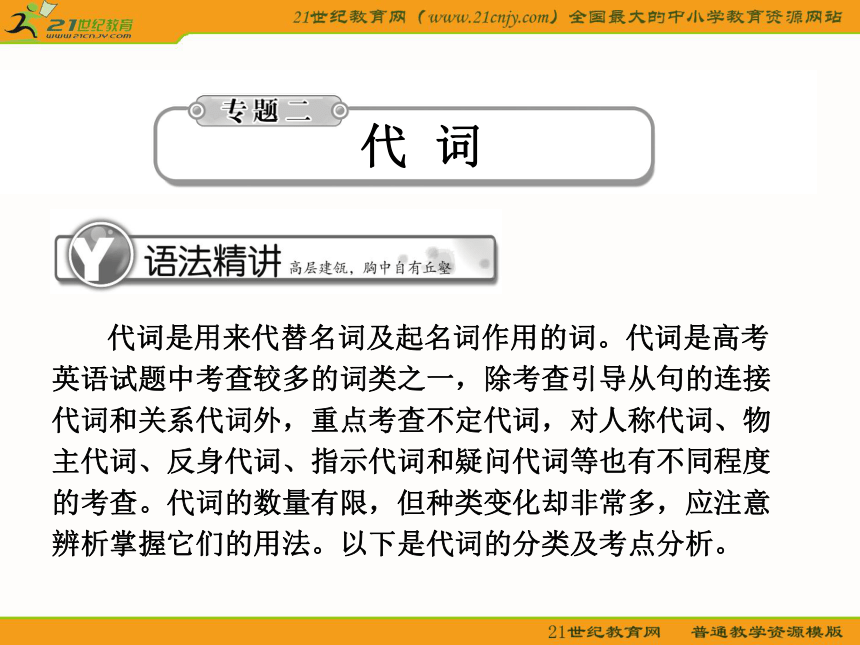 | |
| 格式 | rar | ||
| 文件大小 | 165.7KB | ||
| 资源类型 | 教案 | ||
| 版本资源 | 通用版 | ||
| 科目 | 英语 | ||
| 更新时间 | 2010-12-09 17:34:00 | ||
图片预览

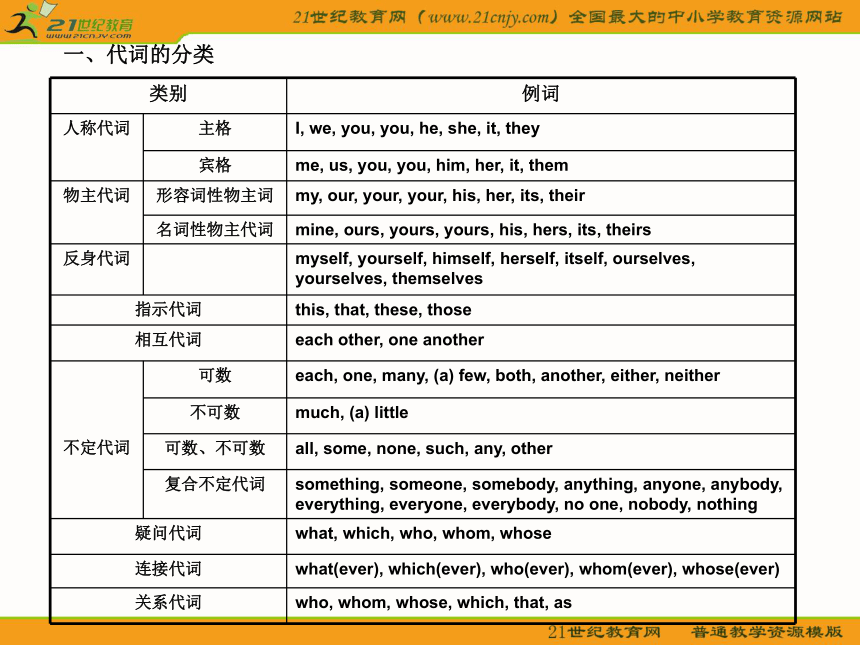
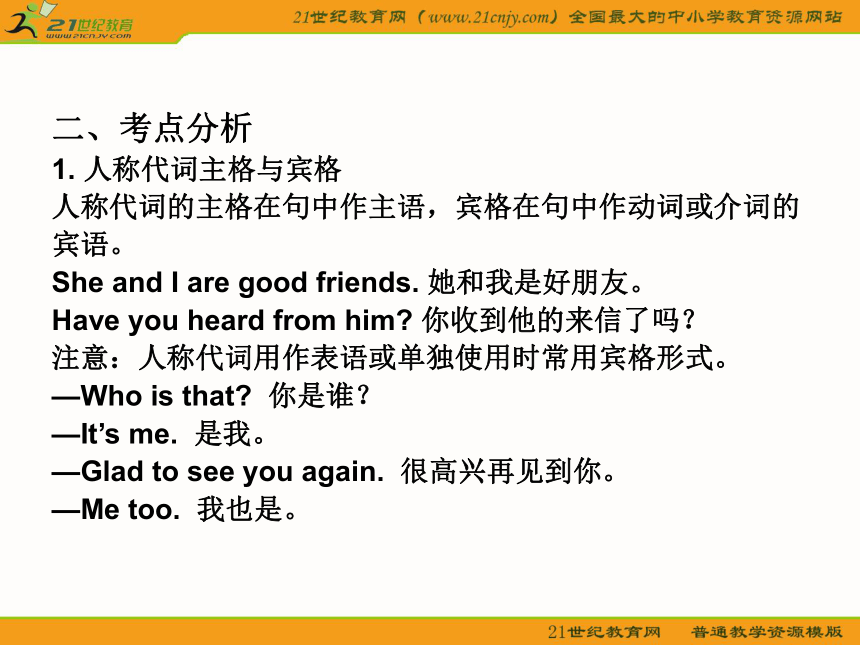
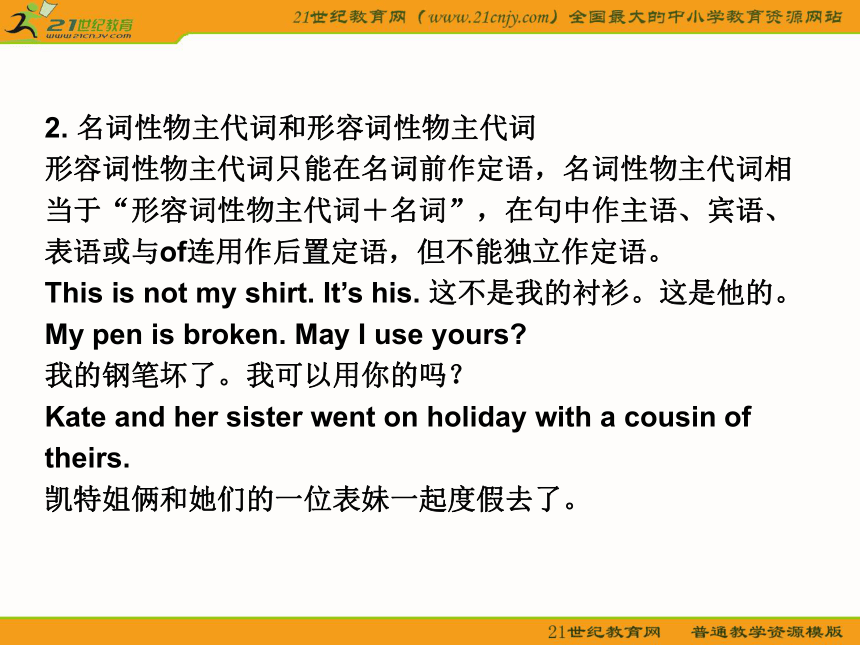
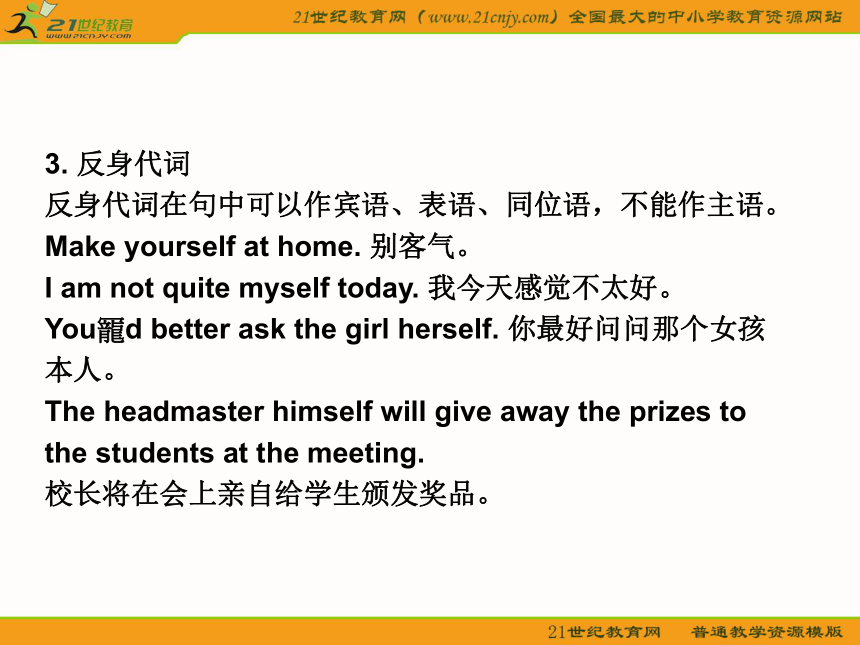
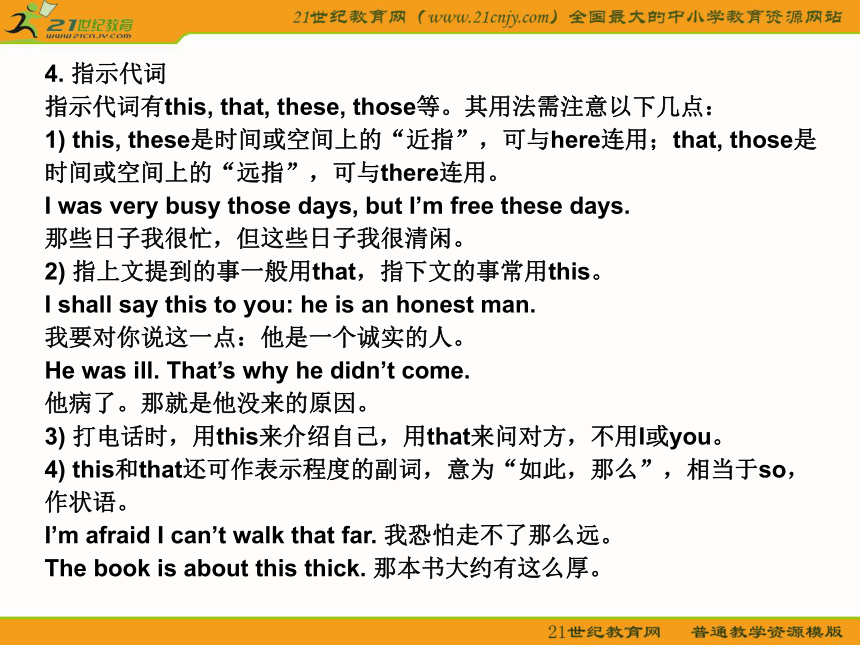
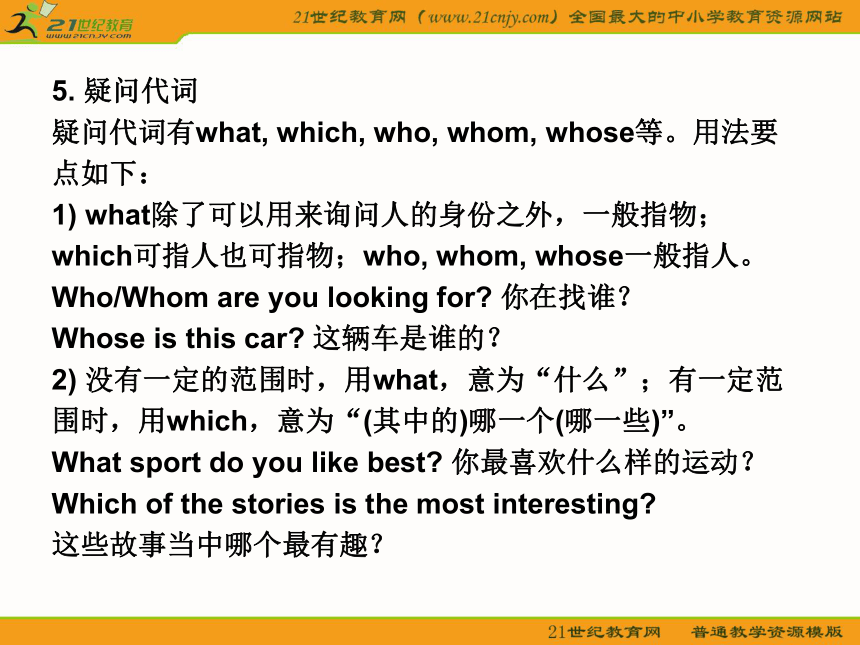
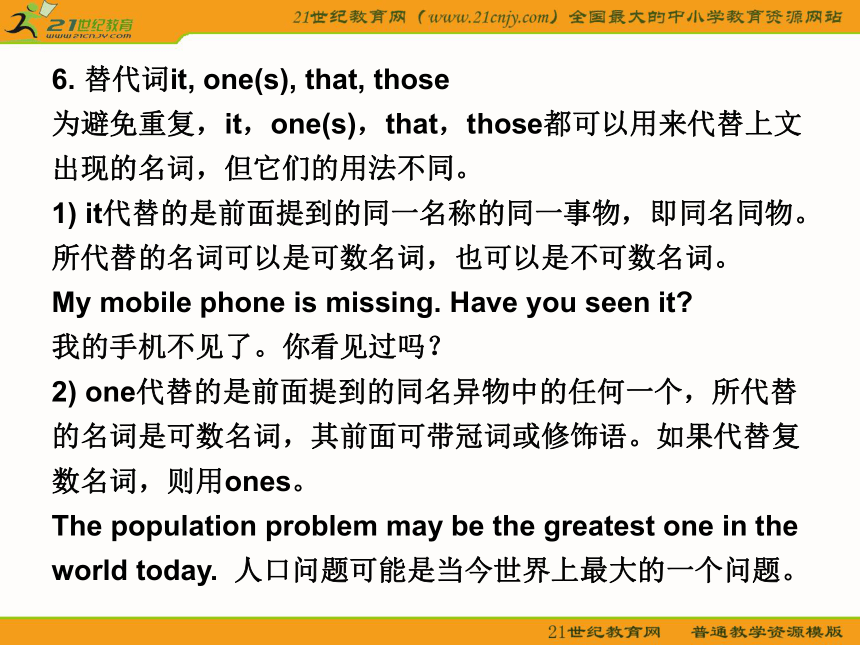
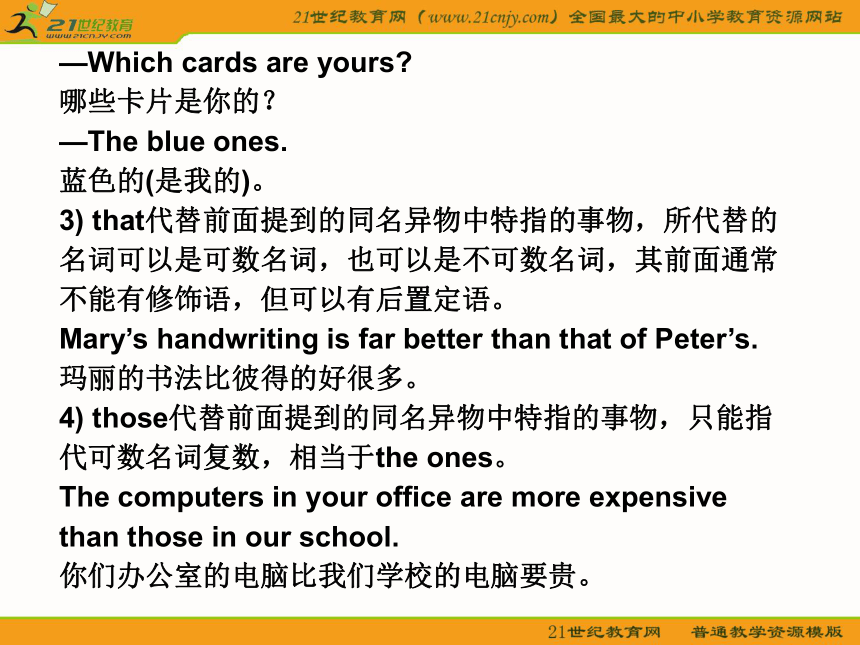
文档简介
课件23张PPT。代 词 代词是用来代替名词及起名词作用的词。代词是高考英语试题中考查较多的词类之一,除考查引导从句的连接代词和关系代词外,重点考查不定代词,对人称代词、物主代词、反身代词、指示代词和疑问代词等也有不同程度的考查。代词的数量有限,但种类变化却非常多,应注意辨析掌握它们的用法。以下是代词的分类及考点分析。一、代词的分类二、考点分析
1. 人称代词主格与宾格
人称代词的主格在句中作主语,宾格在句中作动词或介词的宾语。
She and I are good friends. 她和我是好朋友。
Have you heard from him? 你收到他的来信了吗?
注意:人称代词用作表语或单独使用时常用宾格形式。
—Who is that? 你是谁?
—It’s me. 是我。
—Glad to see you again. 很高兴再见到你。
—Me too. 我也是。2. 名词性物主代词和形容词性物主代词
形容词性物主代词只能在名词前作定语,名词性物主代词相当于“形容词性物主代词+名词”,在句中作主语、宾语、表语或与of连用作后置定语,但不能独立作定语。
This is not my shirt. It’s his. 这不是我的衬衫。这是他的。
My pen is broken. May I use yours?
我的钢笔坏了。我可以用你的吗?
Kate and her sister went on holiday with a cousin of theirs.
凯特姐俩和她们的一位表妹一起度假去了。3. 反身代词
反身代词在句中可以作宾语、表语、同位语,不能作主语。
Make yourself at home. 别客气。
I am not quite myself today. 我今天感觉不太好。
You?d better ask the girl herself. 你最好问问那个女孩本人。
The headmaster himself will give away the prizes to the students at the meeting.
校长将在会上亲自给学生颁发奖品。4. 指示代词
指示代词有this, that, these, those等。其用法需注意以下几点:
1) this, these是时间或空间上的“近指”,可与here连用;that, those是时间或空间上的“远指”,可与there连用。
I was very busy those days, but I’m free these days.
那些日子我很忙,但这些日子我很清闲。
2) 指上文提到的事一般用that,指下文的事常用this。
I shall say this to you: he is an honest man.
我要对你说这一点:他是一个诚实的人。
He was ill. That’s why he didn’t come.
他病了。那就是他没来的原因。
3) 打电话时,用this来介绍自己,用that来问对方,不用I或you。
4) this和that还可作表示程度的副词,意为“如此,那么”,相当于so,作状语。
I’m afraid I can’t walk that far. 我恐怕走不了那么远。
The book is about this thick. 那本书大约有这么厚。5. 疑问代词
疑问代词有what, which, who, whom, whose等。用法要点如下:
1) what除了可以用来询问人的身份之外,一般指物;which可指人也可指物;who, whom, whose一般指人。
Who/Whom are you looking for? 你在找谁?
Whose is this car? 这辆车是谁的?
2) 没有一定的范围时,用what,意为“什么”;有一定范围时,用which,意为“(其中的)哪一个(哪一些)”。
What sport do you like best? 你最喜欢什么样的运动?
Which of the stories is the most interesting?
这些故事当中哪个最有趣?6. 替代词it, one(s), that, those
为避免重复,it,one(s),that,those都可以用来代替上文出现的名词,但它们的用法不同。
1) it代替的是前面提到的同一名称的同一事物,即同名同物。所代替的名词可以是可数名词,也可以是不可数名词。
My mobile phone is missing. Have you seen it?
我的手机不见了。你看见过吗?
2) one代替的是前面提到的同名异物中的任何一个,所代替的名词是可数名词,其前面可带冠词或修饰语。如果代替复数名词,则用ones。
The population problem may be the greatest one in the world today. 人口问题可能是当今世界上最大的一个问题。
—Which cards are yours?
哪些卡片是你的?
—The blue ones.
蓝色的(是我的)。
3) that代替前面提到的同名异物中特指的事物,所代替的名词可以是可数名词,也可以是不可数名词,其前面通常不能有修饰语,但可以有后置定语。
Mary’s handwriting is far better than that of Peter’s.
玛丽的书法比彼得的好很多。
4) those代替前面提到的同名异物中特指的事物,只能指代可数名词复数,相当于the ones。
The computers in your office are more expensive than those in our school.
你们办公室的电脑比我们学校的电脑要贵。7. 常见不定代词的用法
1) some, any
表示“一些”时,some用于肯定句以及表示请求、建议或希望对方作出肯定回答的疑问句中;any用于否定句和疑问句中,用于肯定句时,只和单数名词或不可数名词连用,表示“任何”。
Would you mind buying me some stamps?
你能给我买些邮票吗?
The medicine is on sale everywhere. You can get it at any chemist’s.
这种药到处都卖。你可以在任何一家药店买到。2) both, neither, either
表示两者“都”用both,表示两者“都不”用neither,表示两者中的“任一”用either。
Both teams were in hard training; neither was willing to lose the game.
两个队都在刻苦训练,谁都不愿意输掉这场比赛。
—Do you like tea or coffee?
你想喝茶还是咖啡?
—Either is OK.
什么都行。3) all, none, any
表示三者或三者以上“都”用all,表示“都不”用none,表示其中的“任一”用any。
They were all tired, but none of them would stop to have a rest.
他们都累了,但没有一个人愿意停下来休息。
4) none, no one, nothing
none可指人或物,常接表示范围的of短语,可回答how many或how much;而no one只能指人(=nobody),不能接of短语,可回答who;nothing指物,一般回答what引起的提问。
—Who is in the room?
谁在房间里?
—No one.
没有人。
—What?s in the box?
盒子里有什么?
—Nothing.
什么也没有。
—How much paper is left?
还剩多少纸?
—None.
一张也没有了。5) each, every
each强调个体,表示两个或两个以上中的“每一个”,可作形容词或代词,可作主语、宾语、同位语和定语。every强调整体,表示三者或三者以上中的“每一个”,只能作形容词,在名词前作定语。
Each of us has our private views about it.
我们每个人对这件事都有自己的看法。
Every classroom is equipped with a computer.
所有的教室都配备了电脑。6) other, others, the other, the others, another
other表示泛指,常与复数名词或不可数名词连用;others表示泛指,相当于“other + 复数名词”;“the other+单数可数名词”特指两者中的另一个,常有“one ...the other ...”一个……另一个……的搭配;其复数形式the others或“the other +复数名词”特指在某些人或物中,除去一部分后,“其余的”或“剩下的”人或物;another常用于三者或三者以上中的“另一个”,表示泛指,后接单数名词,也可用于“another+数词+名词复数”。There are other ways to do this exercise.
做这个练习还可以可用别的方法。
It is hard to tell the twin brothers one from the other.
这对孪生兄弟很难辨认。
Some boys are reading; others are listening to the radio.
有些孩子在阅读,有些则在听收音机。
We’ve decided to stay in Shanghai for another two weeks.
我们决定在上海再待两个星期。
7) 复合不定代词
这类不定代词有:everything, everyone, everybody, something, someone, somebody, anything, anyone, anybody, nothing, no one, nobody等。8. it的用法
it可用作人称代词、指示代词等。
1) 指物、人或事。
—Where’s your car?
你的汽车在哪儿呢?
—It’s in the garage.
在车库里。
The baby next door kept me awake. It cried all night.
隔壁的孩子吵得我睡不着觉。他整夜哭个没完。
The manager has resigned. Have you heard about it?
经理辞职了。你听说这件事了吗?2) 指时间、距离、天气等。
It is five miles to the nearest hospital from here.
这里离最近的医院也有五英里。
It’s warmer today than yesterday. 今天比昨天暖和。
3) 充当形式主语或形式宾语,而把真正的主语或宾语(动词不定式、动名词、从句等)放在后面。
It’s no use arguing about that. 争论那件事是没有用的。
We must make it clear to the public that something should be done to stop pollution.
我们必须使公众明白应该采取措施制止污染。
4) 用于强调结构“It + be + 被强调部分 + that(who) + 其他”。
It was not until then that I realized what had happened.
直到那时我才意识到发生了什么。例1:Charles was alone at home, with looking after him.(2009·全国Ⅱ)
A. Someone B. anyone C. not one D. no one
解析:选D。考查复合不定代词的用法。句意为:查理一个人在家,没有人照顾他。由句中的关键词alone可知,应选no one, no one=nobody。
例2:Being a parent is not always easy, and being the parent of a child with special needs often carries with extra stress.(2009·北京)
A. it B. them C. one D. him
解析:选A。考查不定代词的用法。句意为:做家长不容易,做一个有特殊需要的孩子的家长通常会更多了一份压力。it在句中指代being the parent of a child with special needs。例3:I felt so bad all day yesterday that I decided this morning I couldn’t face day like that.(2009·山东)
A. other B. another C. the other D. others
解析:选B。another day 另外一天。句意为:昨天我一整天都感觉很糟糕,以至于今天早晨我决定再也不能那样面对另外一天了。是指在未来的日子中的一天,故用another。
例4:Jane was asked a lot of questions, but she didn’t answer of them.(2009·陕西)
A. Other B. any C. none D. some
解析:选B。考查不定代词。所填词与not构成全部否定,四个选项中只有any与not可以构成not any结构,等于none,表示全部否定,故选B。例5:—Wow! You’ve got so many clothes.
—But of them are in fashion now.(2009·上海)
A. All B. both C. neither D. none
解析:选D。表示三者及三者以上的全部否定用none。
例6:I like this house with a beautiful garden in front, but I don’t have enough money to buy .(2009·四川)
A. One B. it C. this D. that
解析:选B。句意为:我喜欢这个前面有一个美丽花园的房子,但是我没有足够多的钱去把它买下来。第一句话中的this house在该语境中是特指的用法,所以答案为it,表示特指。该题容易误选one,要注意的是one表示泛指。例7:—I’ve read another book this week.
—Well, maybe is not how much you read but what you read that counts.(2009·浙江)
A. This B. that C. there D. it
解析:选D。考查it的用法。分析句子结构可知,此句为强调句,故用it。
例8:Nine in ten parents said there were significant differences in their approach to educating their children compared with of their parents.(2009·江苏)
A. Those B. one C. both D. that
解析:选D。that为特指,指代上文提到的their approach。those指代名词复数;one为泛指。例9:Make sure you’ve got the passports and tickets
and before you leave.(2008·山东)
A. Something B. anything
C. Everything D. nothing
解析:选C。考查复合不定代词的用法。根据句意“在你们离开之前,确保你们已带好护照,车票以及所有的一切”,所以选everything。
例10:Isn’t it amazing how the human body heals after an injury?(2008·江西)
A. himself B. him C. itself D. it
解析:选C。考查反身代词。句中表达的是“人体受伤之后能自愈”,the human body为物,所以应选itself。
1. 人称代词主格与宾格
人称代词的主格在句中作主语,宾格在句中作动词或介词的宾语。
She and I are good friends. 她和我是好朋友。
Have you heard from him? 你收到他的来信了吗?
注意:人称代词用作表语或单独使用时常用宾格形式。
—Who is that? 你是谁?
—It’s me. 是我。
—Glad to see you again. 很高兴再见到你。
—Me too. 我也是。2. 名词性物主代词和形容词性物主代词
形容词性物主代词只能在名词前作定语,名词性物主代词相当于“形容词性物主代词+名词”,在句中作主语、宾语、表语或与of连用作后置定语,但不能独立作定语。
This is not my shirt. It’s his. 这不是我的衬衫。这是他的。
My pen is broken. May I use yours?
我的钢笔坏了。我可以用你的吗?
Kate and her sister went on holiday with a cousin of theirs.
凯特姐俩和她们的一位表妹一起度假去了。3. 反身代词
反身代词在句中可以作宾语、表语、同位语,不能作主语。
Make yourself at home. 别客气。
I am not quite myself today. 我今天感觉不太好。
You?d better ask the girl herself. 你最好问问那个女孩本人。
The headmaster himself will give away the prizes to the students at the meeting.
校长将在会上亲自给学生颁发奖品。4. 指示代词
指示代词有this, that, these, those等。其用法需注意以下几点:
1) this, these是时间或空间上的“近指”,可与here连用;that, those是时间或空间上的“远指”,可与there连用。
I was very busy those days, but I’m free these days.
那些日子我很忙,但这些日子我很清闲。
2) 指上文提到的事一般用that,指下文的事常用this。
I shall say this to you: he is an honest man.
我要对你说这一点:他是一个诚实的人。
He was ill. That’s why he didn’t come.
他病了。那就是他没来的原因。
3) 打电话时,用this来介绍自己,用that来问对方,不用I或you。
4) this和that还可作表示程度的副词,意为“如此,那么”,相当于so,作状语。
I’m afraid I can’t walk that far. 我恐怕走不了那么远。
The book is about this thick. 那本书大约有这么厚。5. 疑问代词
疑问代词有what, which, who, whom, whose等。用法要点如下:
1) what除了可以用来询问人的身份之外,一般指物;which可指人也可指物;who, whom, whose一般指人。
Who/Whom are you looking for? 你在找谁?
Whose is this car? 这辆车是谁的?
2) 没有一定的范围时,用what,意为“什么”;有一定范围时,用which,意为“(其中的)哪一个(哪一些)”。
What sport do you like best? 你最喜欢什么样的运动?
Which of the stories is the most interesting?
这些故事当中哪个最有趣?6. 替代词it, one(s), that, those
为避免重复,it,one(s),that,those都可以用来代替上文出现的名词,但它们的用法不同。
1) it代替的是前面提到的同一名称的同一事物,即同名同物。所代替的名词可以是可数名词,也可以是不可数名词。
My mobile phone is missing. Have you seen it?
我的手机不见了。你看见过吗?
2) one代替的是前面提到的同名异物中的任何一个,所代替的名词是可数名词,其前面可带冠词或修饰语。如果代替复数名词,则用ones。
The population problem may be the greatest one in the world today. 人口问题可能是当今世界上最大的一个问题。
—Which cards are yours?
哪些卡片是你的?
—The blue ones.
蓝色的(是我的)。
3) that代替前面提到的同名异物中特指的事物,所代替的名词可以是可数名词,也可以是不可数名词,其前面通常不能有修饰语,但可以有后置定语。
Mary’s handwriting is far better than that of Peter’s.
玛丽的书法比彼得的好很多。
4) those代替前面提到的同名异物中特指的事物,只能指代可数名词复数,相当于the ones。
The computers in your office are more expensive than those in our school.
你们办公室的电脑比我们学校的电脑要贵。7. 常见不定代词的用法
1) some, any
表示“一些”时,some用于肯定句以及表示请求、建议或希望对方作出肯定回答的疑问句中;any用于否定句和疑问句中,用于肯定句时,只和单数名词或不可数名词连用,表示“任何”。
Would you mind buying me some stamps?
你能给我买些邮票吗?
The medicine is on sale everywhere. You can get it at any chemist’s.
这种药到处都卖。你可以在任何一家药店买到。2) both, neither, either
表示两者“都”用both,表示两者“都不”用neither,表示两者中的“任一”用either。
Both teams were in hard training; neither was willing to lose the game.
两个队都在刻苦训练,谁都不愿意输掉这场比赛。
—Do you like tea or coffee?
你想喝茶还是咖啡?
—Either is OK.
什么都行。3) all, none, any
表示三者或三者以上“都”用all,表示“都不”用none,表示其中的“任一”用any。
They were all tired, but none of them would stop to have a rest.
他们都累了,但没有一个人愿意停下来休息。
4) none, no one, nothing
none可指人或物,常接表示范围的of短语,可回答how many或how much;而no one只能指人(=nobody),不能接of短语,可回答who;nothing指物,一般回答what引起的提问。
—Who is in the room?
谁在房间里?
—No one.
没有人。
—What?s in the box?
盒子里有什么?
—Nothing.
什么也没有。
—How much paper is left?
还剩多少纸?
—None.
一张也没有了。5) each, every
each强调个体,表示两个或两个以上中的“每一个”,可作形容词或代词,可作主语、宾语、同位语和定语。every强调整体,表示三者或三者以上中的“每一个”,只能作形容词,在名词前作定语。
Each of us has our private views about it.
我们每个人对这件事都有自己的看法。
Every classroom is equipped with a computer.
所有的教室都配备了电脑。6) other, others, the other, the others, another
other表示泛指,常与复数名词或不可数名词连用;others表示泛指,相当于“other + 复数名词”;“the other+单数可数名词”特指两者中的另一个,常有“one ...the other ...”一个……另一个……的搭配;其复数形式the others或“the other +复数名词”特指在某些人或物中,除去一部分后,“其余的”或“剩下的”人或物;another常用于三者或三者以上中的“另一个”,表示泛指,后接单数名词,也可用于“another+数词+名词复数”。There are other ways to do this exercise.
做这个练习还可以可用别的方法。
It is hard to tell the twin brothers one from the other.
这对孪生兄弟很难辨认。
Some boys are reading; others are listening to the radio.
有些孩子在阅读,有些则在听收音机。
We’ve decided to stay in Shanghai for another two weeks.
我们决定在上海再待两个星期。
7) 复合不定代词
这类不定代词有:everything, everyone, everybody, something, someone, somebody, anything, anyone, anybody, nothing, no one, nobody等。8. it的用法
it可用作人称代词、指示代词等。
1) 指物、人或事。
—Where’s your car?
你的汽车在哪儿呢?
—It’s in the garage.
在车库里。
The baby next door kept me awake. It cried all night.
隔壁的孩子吵得我睡不着觉。他整夜哭个没完。
The manager has resigned. Have you heard about it?
经理辞职了。你听说这件事了吗?2) 指时间、距离、天气等。
It is five miles to the nearest hospital from here.
这里离最近的医院也有五英里。
It’s warmer today than yesterday. 今天比昨天暖和。
3) 充当形式主语或形式宾语,而把真正的主语或宾语(动词不定式、动名词、从句等)放在后面。
It’s no use arguing about that. 争论那件事是没有用的。
We must make it clear to the public that something should be done to stop pollution.
我们必须使公众明白应该采取措施制止污染。
4) 用于强调结构“It + be + 被强调部分 + that(who) + 其他”。
It was not until then that I realized what had happened.
直到那时我才意识到发生了什么。例1:Charles was alone at home, with looking after him.(2009·全国Ⅱ)
A. Someone B. anyone C. not one D. no one
解析:选D。考查复合不定代词的用法。句意为:查理一个人在家,没有人照顾他。由句中的关键词alone可知,应选no one, no one=nobody。
例2:Being a parent is not always easy, and being the parent of a child with special needs often carries with extra stress.(2009·北京)
A. it B. them C. one D. him
解析:选A。考查不定代词的用法。句意为:做家长不容易,做一个有特殊需要的孩子的家长通常会更多了一份压力。it在句中指代being the parent of a child with special needs。例3:I felt so bad all day yesterday that I decided this morning I couldn’t face day like that.(2009·山东)
A. other B. another C. the other D. others
解析:选B。another day 另外一天。句意为:昨天我一整天都感觉很糟糕,以至于今天早晨我决定再也不能那样面对另外一天了。是指在未来的日子中的一天,故用another。
例4:Jane was asked a lot of questions, but she didn’t answer of them.(2009·陕西)
A. Other B. any C. none D. some
解析:选B。考查不定代词。所填词与not构成全部否定,四个选项中只有any与not可以构成not any结构,等于none,表示全部否定,故选B。例5:—Wow! You’ve got so many clothes.
—But of them are in fashion now.(2009·上海)
A. All B. both C. neither D. none
解析:选D。表示三者及三者以上的全部否定用none。
例6:I like this house with a beautiful garden in front, but I don’t have enough money to buy .(2009·四川)
A. One B. it C. this D. that
解析:选B。句意为:我喜欢这个前面有一个美丽花园的房子,但是我没有足够多的钱去把它买下来。第一句话中的this house在该语境中是特指的用法,所以答案为it,表示特指。该题容易误选one,要注意的是one表示泛指。例7:—I’ve read another book this week.
—Well, maybe is not how much you read but what you read that counts.(2009·浙江)
A. This B. that C. there D. it
解析:选D。考查it的用法。分析句子结构可知,此句为强调句,故用it。
例8:Nine in ten parents said there were significant differences in their approach to educating their children compared with of their parents.(2009·江苏)
A. Those B. one C. both D. that
解析:选D。that为特指,指代上文提到的their approach。those指代名词复数;one为泛指。例9:Make sure you’ve got the passports and tickets
and before you leave.(2008·山东)
A. Something B. anything
C. Everything D. nothing
解析:选C。考查复合不定代词的用法。根据句意“在你们离开之前,确保你们已带好护照,车票以及所有的一切”,所以选everything。
例10:Isn’t it amazing how the human body heals after an injury?(2008·江西)
A. himself B. him C. itself D. it
解析:选C。考查反身代词。句中表达的是“人体受伤之后能自愈”,the human body为物,所以应选itself。
